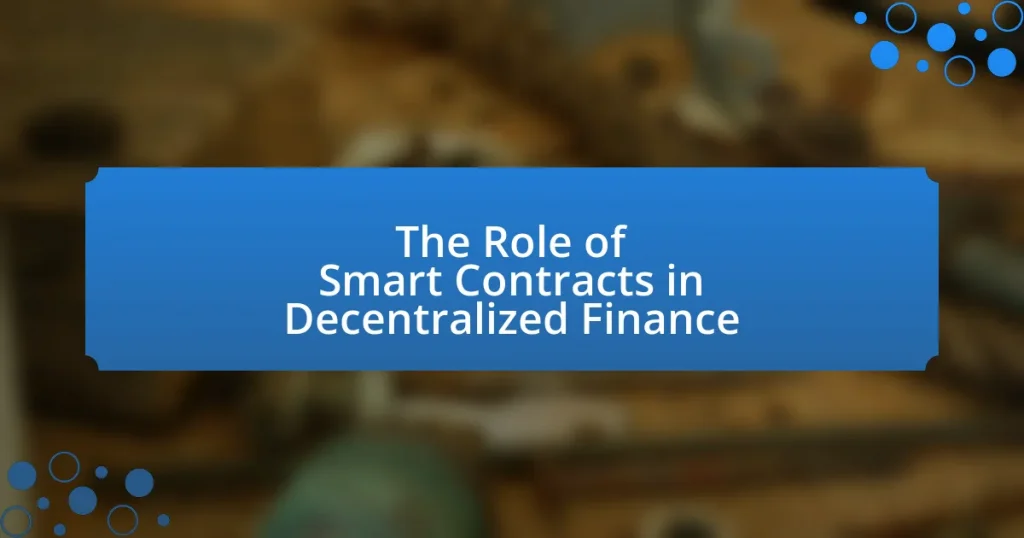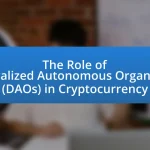Smart contracts are self-executing agreements with terms encoded directly into blockchain technology, playing a crucial role in decentralized finance (DeFi) by automating financial transactions and services. This article explores how smart contracts function within DeFi ecosystems, their programming languages, and key features that enhance efficiency, transparency, and security. It also examines the benefits of using smart contracts, including cost savings and faster transaction processing, while addressing associated risks and best practices for development. Additionally, the article highlights the implementation of smart contracts in various DeFi applications, their interaction with other blockchain technologies, and the importance of oracles in enhancing their functionality.
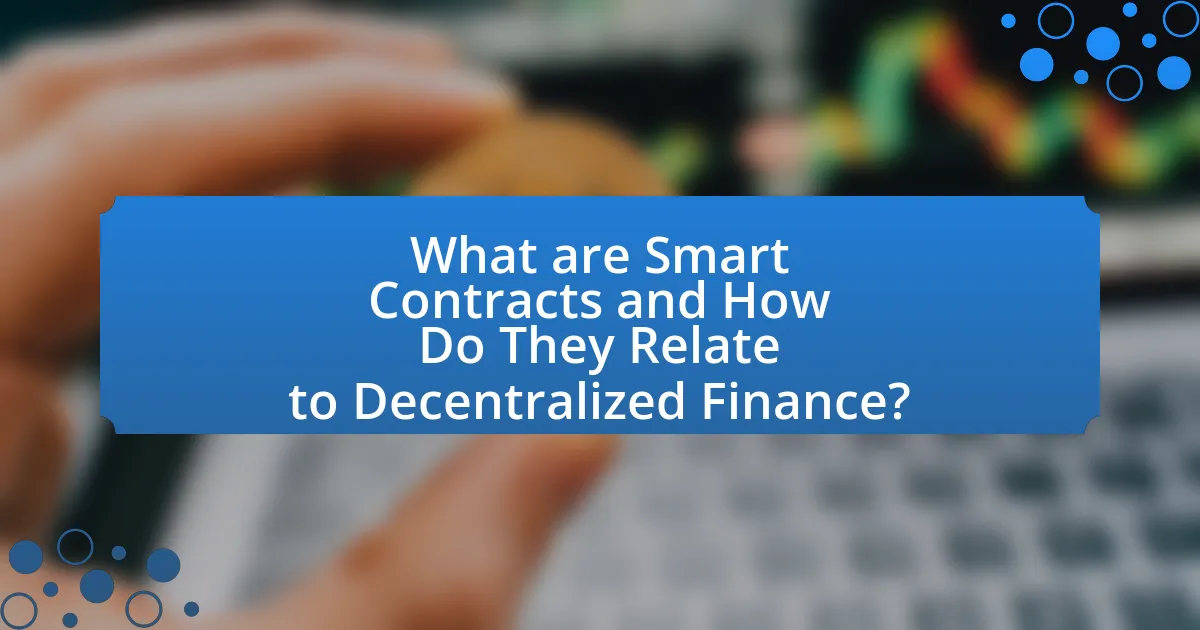
What are Smart Contracts and How Do They Relate to Decentralized Finance?
Smart contracts are self-executing contracts with the terms of the agreement directly written into code, operating on blockchain technology. They facilitate, verify, and enforce the negotiation or performance of a contract without the need for intermediaries. In decentralized finance (DeFi), smart contracts enable automated financial transactions and services, such as lending, borrowing, and trading, by eliminating the need for traditional financial institutions. This automation enhances efficiency and reduces costs, as evidenced by platforms like Ethereum, which hosts numerous DeFi applications that utilize smart contracts to execute transactions securely and transparently.
How do smart contracts function within decentralized finance ecosystems?
Smart contracts function as self-executing agreements with the terms directly written into code within decentralized finance (DeFi) ecosystems. These contracts automate processes such as lending, borrowing, and trading without the need for intermediaries, thereby increasing efficiency and reducing costs. For example, platforms like Aave and Uniswap utilize smart contracts to facilitate peer-to-peer transactions, ensuring that funds are transferred only when predefined conditions are met. This automation is secured by blockchain technology, which provides transparency and immutability, ensuring that once a smart contract is deployed, it cannot be altered. The reliance on smart contracts in DeFi has led to a significant increase in transaction speed and a reduction in the potential for human error, as evidenced by the rapid growth of DeFi platforms, which collectively hold billions in assets.
What programming languages are commonly used to create smart contracts?
Solidity and Vyper are the most commonly used programming languages for creating smart contracts, particularly on the Ethereum blockchain. Solidity, a statically typed language influenced by JavaScript, C++, and Python, is specifically designed for writing smart contracts and is widely adopted due to its extensive documentation and community support. Vyper, on the other hand, is a newer language that emphasizes simplicity and security, making it suitable for developers who prioritize these aspects in their smart contract development. Both languages are integral to the functionality of decentralized finance applications, as they enable the automation of transactions and enforce contractual agreements without intermediaries.
What are the key features of smart contracts that enhance decentralized finance?
Smart contracts enhance decentralized finance through automation, transparency, security, and programmability. Automation allows transactions to execute automatically when predefined conditions are met, reducing the need for intermediaries and increasing efficiency. Transparency is achieved as all transactions are recorded on a public blockchain, enabling users to verify and audit the contract’s execution. Security is provided through cryptographic techniques that protect against tampering and fraud, ensuring that the contract operates as intended. Lastly, programmability allows developers to create complex financial products and services, enabling innovation in the DeFi space. These features collectively contribute to a more efficient, secure, and accessible financial ecosystem.
Why are smart contracts essential for decentralized finance?
Smart contracts are essential for decentralized finance because they automate and enforce agreements without intermediaries, ensuring trust and efficiency in transactions. By executing predefined conditions automatically, smart contracts eliminate the need for third-party verification, reducing costs and time associated with traditional financial processes. For instance, in lending protocols, smart contracts facilitate instant loan disbursements and repayments based on collateral conditions, enhancing liquidity and accessibility. The Ethereum blockchain, which popularized smart contracts, has processed millions of transactions, demonstrating their effectiveness in enabling decentralized applications and financial services.
How do smart contracts eliminate the need for intermediaries in financial transactions?
Smart contracts eliminate the need for intermediaries in financial transactions by automating and enforcing agreements through code on a blockchain. This automation reduces reliance on third parties, such as banks or brokers, to facilitate and verify transactions. For example, when conditions specified in a smart contract are met, the contract executes automatically, ensuring trust and transparency without human intervention. The decentralized nature of blockchain technology further enhances security and reduces the risk of fraud, as all parties can independently verify the transaction history.
What role do smart contracts play in ensuring transparency and security in decentralized finance?
Smart contracts play a crucial role in ensuring transparency and security in decentralized finance by automating and enforcing agreements without intermediaries. They operate on blockchain technology, which provides an immutable and transparent ledger, allowing all participants to verify transactions independently. This transparency reduces the risk of fraud and manipulation, as all contract terms and transaction histories are publicly accessible. Additionally, smart contracts execute automatically when predefined conditions are met, minimizing human error and enhancing security by eliminating the need for trust in a third party. The combination of these features fosters a secure and transparent environment for financial transactions in decentralized finance.
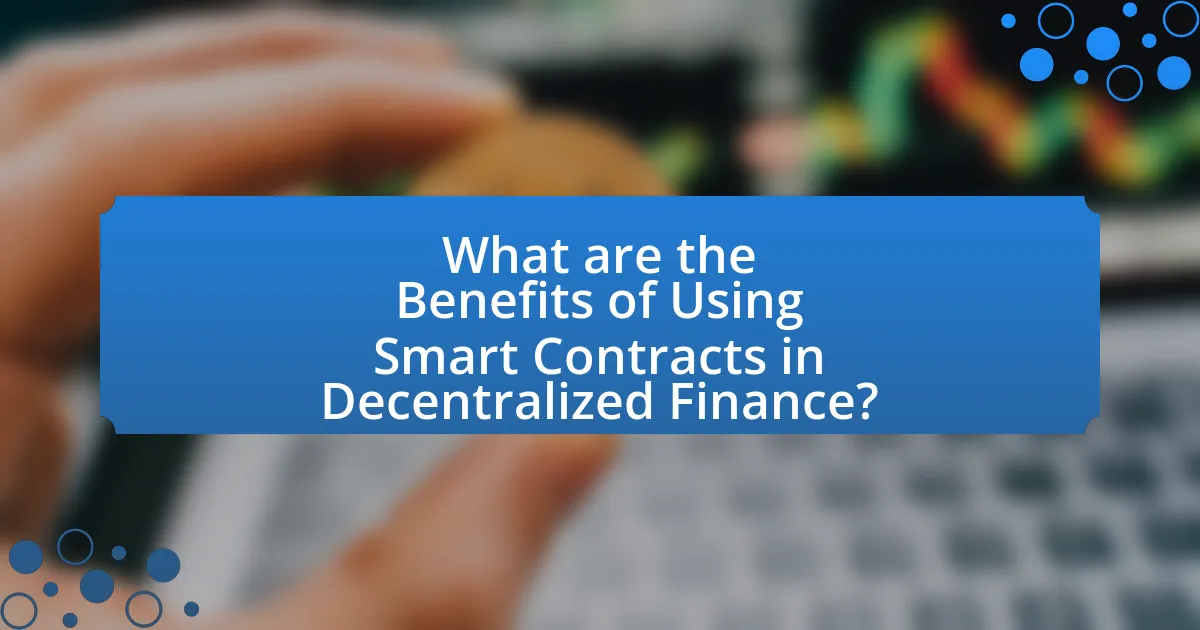
What are the Benefits of Using Smart Contracts in Decentralized Finance?
Smart contracts in decentralized finance (DeFi) provide benefits such as automation, transparency, and security. Automation allows transactions to execute automatically when predefined conditions are met, reducing the need for intermediaries and minimizing human error. Transparency is achieved through the public nature of blockchain technology, enabling all participants to verify transactions and contract terms, which fosters trust. Security is enhanced as smart contracts are immutable and tamper-proof, protecting against fraud and unauthorized changes. These benefits collectively contribute to a more efficient and reliable financial ecosystem.
How do smart contracts improve efficiency in financial transactions?
Smart contracts improve efficiency in financial transactions by automating processes and eliminating intermediaries. This automation reduces the time and cost associated with traditional transaction methods, as smart contracts execute predefined conditions without the need for manual intervention. For instance, a study by the World Economic Forum estimates that by 2025, smart contracts could save the financial services industry up to $20 billion annually by streamlining operations and reducing errors. Additionally, the transparency and security provided by blockchain technology enhance trust among parties, further accelerating transaction speeds and reducing disputes.
What are the cost savings associated with using smart contracts in decentralized finance?
Smart contracts in decentralized finance (DeFi) lead to significant cost savings primarily by eliminating intermediaries, which reduces transaction fees. Traditional financial systems often require banks or brokers to facilitate transactions, incurring costs that can range from 1% to 5% of the transaction value. In contrast, smart contracts automate processes on blockchain networks, allowing peer-to-peer transactions without the need for intermediaries, thereby minimizing or even eliminating these fees.
Additionally, smart contracts enhance efficiency by executing transactions automatically when predefined conditions are met, which reduces the time and resources spent on manual processing. According to a report by the World Economic Forum, the adoption of blockchain technology, including smart contracts, could save the global economy up to $3 trillion by 2030 through increased efficiency and reduced operational costs.
These cost savings are further amplified by the transparency and security of blockchain technology, which reduces the risk of fraud and the associated costs of compliance and dispute resolution. Overall, the integration of smart contracts in DeFi represents a transformative shift towards more cost-effective financial transactions.
How do smart contracts facilitate faster transaction processing?
Smart contracts facilitate faster transaction processing by automating and executing agreements without the need for intermediaries. This automation reduces the time required for transaction verification and execution, as smart contracts operate on blockchain technology, which allows for real-time processing. According to a report by the World Economic Forum, smart contracts can significantly decrease transaction times from days to minutes, enhancing efficiency in decentralized finance applications.
What risks are associated with smart contracts in decentralized finance?
Smart contracts in decentralized finance (DeFi) are associated with several risks, including coding vulnerabilities, lack of regulatory oversight, and potential for malicious attacks. Coding vulnerabilities can lead to exploits, as evidenced by the DAO hack in 2016, where a flaw in the smart contract code resulted in the loss of $60 million worth of Ether. Additionally, the absence of regulatory frameworks can create uncertainty and expose users to fraud. Malicious attacks, such as reentrancy attacks, can compromise the integrity of smart contracts, further highlighting the inherent risks in DeFi ecosystems.
How can vulnerabilities in smart contracts lead to financial losses?
Vulnerabilities in smart contracts can lead to financial losses by allowing malicious actors to exploit coding errors or security flaws. For instance, the DAO hack in 2016 resulted in a loss of $60 million due to a reentrancy vulnerability, where attackers repeatedly called a function before the contract could update its state. Such vulnerabilities can enable unauthorized access to funds, manipulation of contract logic, or unintended execution of transactions, ultimately resulting in significant financial damage to users and investors in decentralized finance platforms.
What measures can be taken to mitigate risks associated with smart contracts?
To mitigate risks associated with smart contracts, developers should implement thorough code audits and testing protocols. Code audits involve reviewing the smart contract’s code for vulnerabilities and errors, which can prevent exploits and unintended behaviors. Testing protocols, including unit tests and integration tests, ensure that the smart contract functions as intended under various scenarios. Additionally, using formal verification methods can mathematically prove the correctness of the smart contract’s logic, further reducing risks. According to a report by ConsenSys, 70% of smart contracts contain vulnerabilities, highlighting the importance of these measures in enhancing security and reliability.
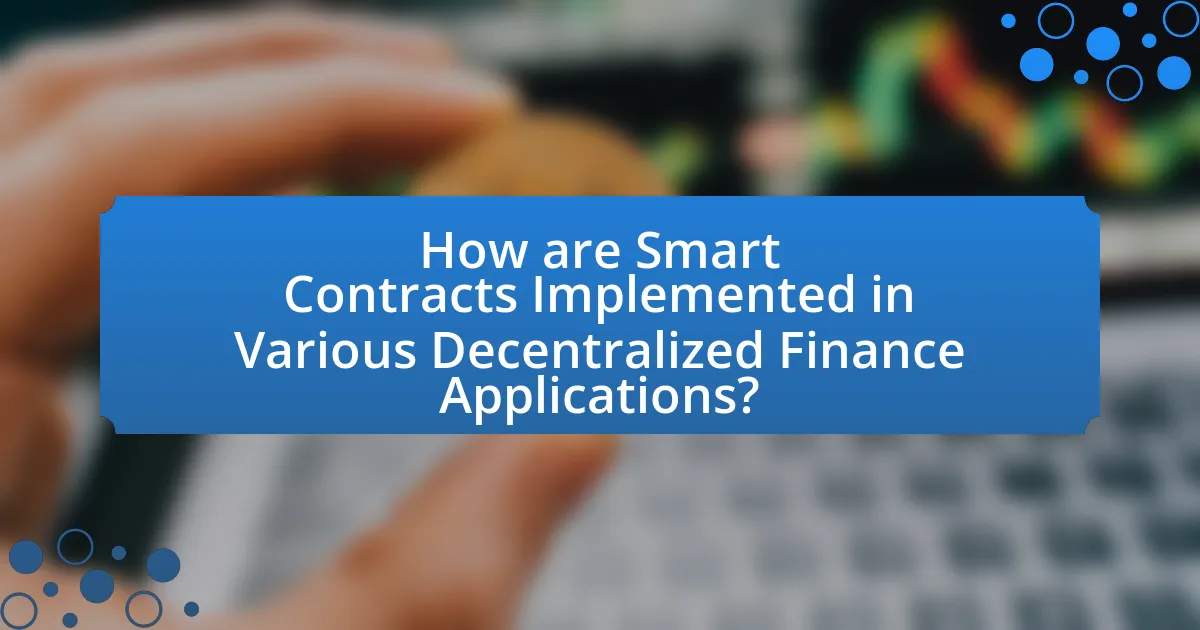
How are Smart Contracts Implemented in Various Decentralized Finance Applications?
Smart contracts are implemented in various decentralized finance (DeFi) applications primarily through automated protocols that execute transactions based on predefined conditions. These contracts facilitate functions such as lending, borrowing, trading, and yield farming without intermediaries, ensuring transparency and security. For instance, platforms like Aave and Compound utilize smart contracts to manage lending pools, allowing users to deposit assets and earn interest automatically based on algorithmic calculations. Additionally, decentralized exchanges like Uniswap employ smart contracts to enable automated trading of tokens through liquidity pools, where trades are executed based on the liquidity available. The implementation of smart contracts in these applications is validated by their ability to operate autonomously on blockchain networks, reducing the risk of human error and enhancing operational efficiency.
What are the most common use cases for smart contracts in decentralized finance?
The most common use cases for smart contracts in decentralized finance include automated trading, lending and borrowing, and yield farming. Automated trading utilizes smart contracts to execute trades based on predefined conditions, enhancing efficiency and reducing the need for intermediaries. Lending and borrowing platforms leverage smart contracts to facilitate peer-to-peer transactions, allowing users to lend assets and earn interest or borrow assets without traditional banks. Yield farming involves using smart contracts to allocate liquidity in decentralized exchanges, enabling users to earn rewards for providing liquidity. These use cases demonstrate the transformative potential of smart contracts in streamlining financial processes and enhancing accessibility in the DeFi ecosystem.
How do decentralized exchanges utilize smart contracts for trading?
Decentralized exchanges utilize smart contracts to automate and facilitate trading without intermediaries. Smart contracts execute trades based on predefined conditions, ensuring that transactions are secure, transparent, and trustless. For instance, when a user places an order, the smart contract verifies the conditions, such as asset availability and price, before executing the trade. This process eliminates the need for a central authority, reducing the risk of fraud and enhancing user control over funds. The Ethereum blockchain, which hosts many decentralized exchanges, supports these smart contracts, allowing for programmable trading functionalities that adhere to the rules set by the users.
What role do smart contracts play in lending and borrowing platforms?
Smart contracts automate and enforce the terms of lending and borrowing agreements on decentralized finance platforms. They eliminate the need for intermediaries by executing transactions automatically when predefined conditions are met, ensuring trust and transparency. For instance, if a borrower fails to repay a loan, the smart contract can automatically trigger collateral liquidation to protect the lender’s interests. This functionality enhances efficiency and reduces operational costs, as evidenced by platforms like Aave and Compound, which utilize smart contracts to facilitate millions of transactions securely and transparently.
How do smart contracts interact with other blockchain technologies in decentralized finance?
Smart contracts interact with other blockchain technologies in decentralized finance by automating and enforcing agreements without intermediaries, enabling seamless transactions across various platforms. They utilize blockchain protocols like Ethereum to execute code that governs financial agreements, ensuring transparency and security. For instance, smart contracts can integrate with decentralized exchanges (DEXs) to facilitate trading without the need for a central authority, allowing users to swap tokens directly. Additionally, they can interact with lending protocols, enabling users to borrow and lend assets automatically based on predefined conditions. This interoperability is supported by standards such as ERC-20 and ERC-721, which allow different tokens and applications to communicate effectively within the ecosystem.
What is the relationship between smart contracts and decentralized autonomous organizations (DAOs)?
Smart contracts are essential components of decentralized autonomous organizations (DAOs) as they automate and enforce the rules and governance of these entities. DAOs utilize smart contracts to facilitate decision-making processes, manage funds, and execute transactions without the need for intermediaries. For instance, the Ethereum blockchain, which supports many DAOs, relies on smart contracts to ensure that all actions taken by the organization are transparent, verifiable, and executed according to predefined conditions. This relationship underscores the importance of smart contracts in enabling the decentralized and trustless nature of DAOs, allowing them to operate autonomously while adhering to the collective decisions of their members.
How do oracles enhance the functionality of smart contracts in decentralized finance?
Oracles enhance the functionality of smart contracts in decentralized finance by providing real-time, external data that smart contracts require to execute conditions accurately. For instance, oracles can supply price feeds for assets, enabling automated trading and lending protocols to function based on current market conditions. This integration allows smart contracts to respond dynamically to changes in the external environment, such as price fluctuations or event outcomes, which is essential for applications like decentralized exchanges and insurance products. The use of oracles has been validated by projects like Chainlink, which has established a decentralized network of oracles that ensures data integrity and reliability, thereby increasing the overall trustworthiness and efficiency of smart contracts in the DeFi ecosystem.
What are the best practices for developing and deploying smart contracts in decentralized finance?
The best practices for developing and deploying smart contracts in decentralized finance include thorough testing, security audits, and adherence to coding standards. Thorough testing ensures that the smart contract functions as intended under various conditions, reducing the risk of bugs or vulnerabilities. Security audits, conducted by independent experts, identify potential weaknesses and ensure that the contract is resistant to attacks, which is critical given that vulnerabilities can lead to significant financial losses; for instance, the DAO hack in 2016 resulted in the loss of $60 million due to a vulnerability in the smart contract code. Adhering to coding standards, such as using established frameworks and libraries, promotes code readability and maintainability, which is essential for future updates and collaboration among developers. These practices collectively enhance the reliability and security of smart contracts in the decentralized finance ecosystem.
How can developers ensure the security of smart contracts before deployment?
Developers can ensure the security of smart contracts before deployment by conducting thorough code audits and utilizing formal verification methods. Code audits involve reviewing the smart contract code for vulnerabilities and logical errors, often performed by third-party security firms, which can identify issues that developers may overlook. Formal verification uses mathematical methods to prove the correctness of the algorithms underlying the smart contracts, ensuring they behave as intended under all conditions. According to a report by ConsenSys Diligence, 70% of smart contract vulnerabilities can be mitigated through comprehensive audits and testing, highlighting the importance of these practices in enhancing security.
What tools and frameworks are recommended for smart contract development in decentralized finance?
Recommended tools and frameworks for smart contract development in decentralized finance include Solidity, Truffle, Hardhat, and OpenZeppelin. Solidity is the primary programming language for writing Ethereum smart contracts, while Truffle and Hardhat are development environments that facilitate testing and deployment. OpenZeppelin provides a library of secure smart contract templates that developers can use to ensure best practices. These tools are widely adopted in the DeFi ecosystem, as they enhance security, streamline development processes, and support efficient testing and deployment of smart contracts.
